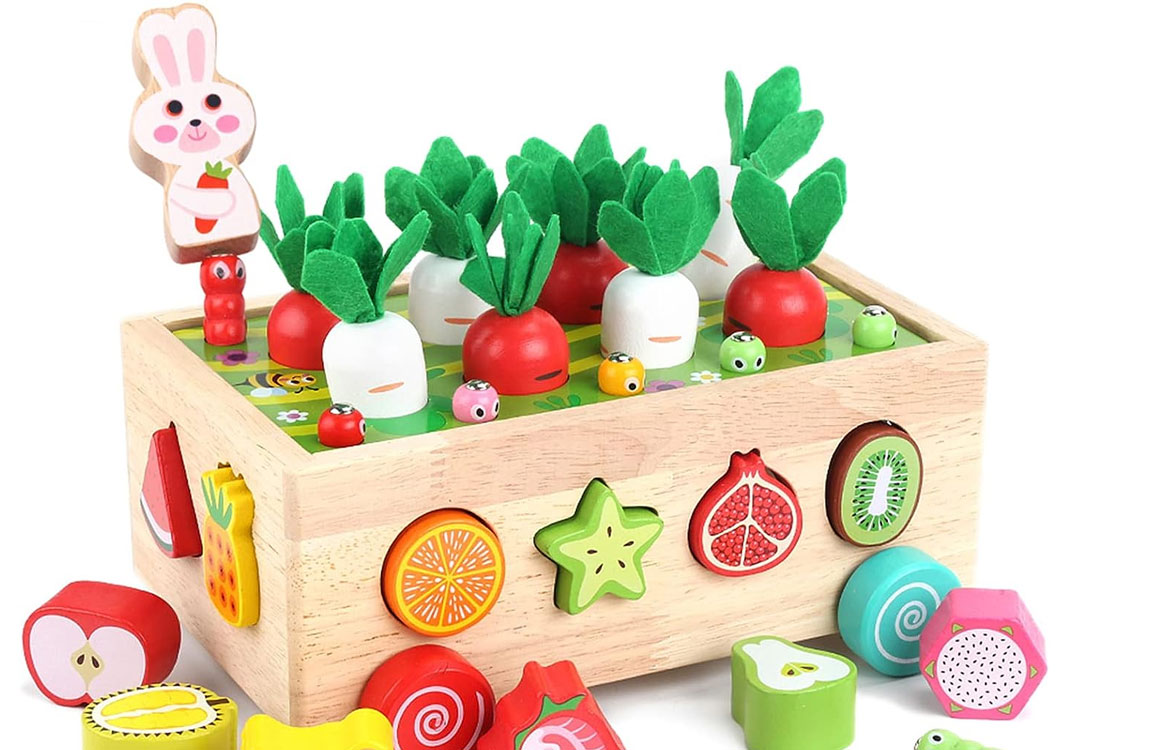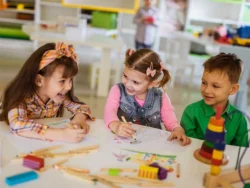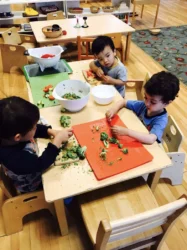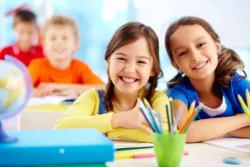At this age, babies explore their surroundings with their hands and mouth. This is why educational toys for infants should have large parts that can’t be broken off and become choking hazards.
Unlike flashcards and memorization exercises, this interactive poster makes learning fun for your toddler. It features colorful illustrations and teaches them colors, shapes, animals, and the alphabet.
1. They help your baby learn
It’s wonderful to see a child’s face light up when they open their Christmas gifts or birthday gifts. But it’s even better when you know that the toys they play with will help them learn.
Infants can start using their hands to grab things and discover that their physical actions have an effect on their environment (like pushing buttons on a toy to make animals pop up). They also learn about colors, shapes, and sounds through themed toys.
They also develop problem-solving skills through games such as stacking blocks and putting them in or out of a bucket. And they can improve their fine motor skills through toys such as knobbed puzzles and stacking cups. Their concentration spans are short, but baby educational toys help them stay engaged and interested.
2. They help your baby develop
Babies learn through exploring with their senses during their first months of life. Large rings, stuffed animals, rattles, and teethers can help them develop sensory stimulation and familiarity with their surroundings.
They also start developing fine motor skills by kicking a ball and scribbling with crayons. As they grow older, they’ll master putting together puzzles and building towers four or more blocks high. This helps them improve their motor skills and learn that they have control over their environment.
When choosing toys for your baby, try to avoid gender stereotypes. While it’s true that girls tend to gravitate toward dolls and soft toys while boys prefer trains, cars, and dark colors, both can benefit from educational toys.
3. They help your baby develop social skills
As your baby gets older, they begin to learn how to interact with other children and adults. Educational toys that help them practice social skills are great for this age. For example, a simple wooden ball drop toy teaches them object permanence and cause and effect, while a busy box with a bead maze, learning clock, spinners, shape sorter, and abacus is a popular choice for toddlers.
Your toddler will also love toys that respond to their actions, such as those that play music or name a letter, shape, or number when they hit them. For example, a toy that plays a musical ABC book will encourage them to interact with it and read with you. They’ll also enjoy copying your facial expressions and trying to raise their eyebrows or give a big smile. This is an important part of their emotional development.
4. They help your baby develop cognitive skills
Cognitive skills are the core abilities that help us think, learn, read, concentrate, and problem-solve. Educational toys help children develop these important skills by making learning fun and engaging.
Between two and three months, babies start to discover their hands. Grabbing, holding, and shaking their toys becomes great fun for them and can be an opportunity to practice some of their developing gross motor skills. They also start to understand cause and effect (I move my hand; the toy makes a noise).
Toys that encourage exploration help your baby build cognitive skills. These toys include a variety of textures, colors, and sounds and are designed to be interactive. This cuddly toy cow provides visual, sound, and tactile stimulation and plays 30+ songs, melodies, sounds, and phrases. It is made of BPA-free continuous plastic loops to promote grasping and two-handed play and includes a center cube that encourages rattle play.
5. They help your baby develop motor skills
As babies grow into toddlers, toys become more complex and help develop motor skills. Educational toys can also help kids explore their creativity and imagination.
For example, if your baby bangs an object on the table, it’s more than just making noise – they’re exploring cause and effect. They’re trying to figure out what happens when they bang something and whether the object will bounce back.
Stacking rings is another activity that helps improve fine motor skills and hand-eye coordination. It also introduces the concept of seriation, which is an early math concept that teaches about size, shape, and weight. A fun toy for babies is the Stack Up Cups which have different-sized holes and add sensory stimulation to their stacking play. They even make great bath toys for toddlers. So, when choosing toys for your child, remember these benefits!
6. They help your baby develop sensory skills
Babies explore their world with the help of sensory toys. They can feel different textures, learn about colors and sounds, and explore their catching skills.
Babies can also develop their problem-solving skills when using educational toys. For example, if a baby throws a toy off the couch and cries, they can experiment with their ability to retrieve it. This is an important skill for them to practice, as it will help them when they are older.
Toys can help children develop a variety of skills, including fine motor skills, language, creativity, and body awareness. But how do you know which toy is best for your child? Every child plays differently, so you should choose a toy based on your child’s interests. You can also find toys that focus on specific skills like a hoop to develop motor skills or a stacking cup toy for early fine motor development.
7. They help your baby develop language skills
For babies between six and twelve months, educational toys can help them develop their touch, sight, and hearing skills. They can play with a toy that has bright colors and makes sounds, or they can look at books that introduce them to animals, numbers, shapes, and other objects.
At this age, babies are also able to string a few single words together. They like to imitate their parents and other adults, so they may enjoy pretending to play with toys or reading picture books.
Try activities that involve listening, such as a walk around your neighborhood where you ask them to listen for different sounds or the Playskool Busy Poppin’ Pals pop-up toy (view at Amazon) that encourages them to stack up cups. Or try clapping rhythms to see if they can copy you. This will teach them about patterning and timing.
8. They help your baby develop emotional skills
Babies and toddlers love toys that respond to their actions. For example, they are fascinated by toys that make sounds when hit or those that activate different pictures. They also enjoy toys that teach them letters, colors, and numbers.
Educational toys help your child develop their emotional skills by fostering curiosity and introducing them to new experiences. They can also help them overcome their fears by exposing them to things they’re afraid of in safe ways.
An activity cube is a great educational toy for 6-month-old babies. This one from VTech allows you to set it in English, Spanish, or French mode and has different songs, lights, shapes, and numbers. It also has a bead maze, learning clock, spinner, and abacus to help your baby develop their cognitive and motor skills. It also has a soft book that helps them learn about letters and sounds.
9. They help your baby develop problem-solving skills
At this age, babies begin to understand that their physical actions have an impact on the world around them. They are fascinated by cause-and-effect and will love toys that respond to their actions. For example, they will enjoy a toy that plays music or characters when they hit the button. This toy can also teach them colors, shapes, and numbers.
Babies at this age start to explore their hands, which means that they are grabbing and bringing objects to their mouths to teeth on them. It’s important that toys are safe and don’t have small parts, which can be a choking hazard for infants. This musical cuddly toy is soft and has crinkle, rattle, and sing-along features to stimulate the baby’s senses and encourage interaction. It also helps develop fine motor skills by grasping and shaking the beads in the center of the toy.
10. They help your baby develop concentration skills
Educational toys can help babies develop concentration skills. For example, puzzles require children to follow a step-by-step sequence, which helps them focus and concentrate for longer periods of time. Educational toys can also help them build fine motor skills and hand-eye coordination.
At 6 months, babies begin to grasp objects with purpose, and they typically bring everything they grab to their mouth to teeth on. You can encourage this by putting toys out that make sounds or have different shapes and textures.
Other sensory-stimulating games include banging objects together, comparing the size of two objects and noticing whether one makes more noise than the other, or playing flashlight. You can even try a simple experiment by shining a flashlight across the ceiling or walls and then asking your baby to catch it. They’ll love this game because it’s fun and exciting!







